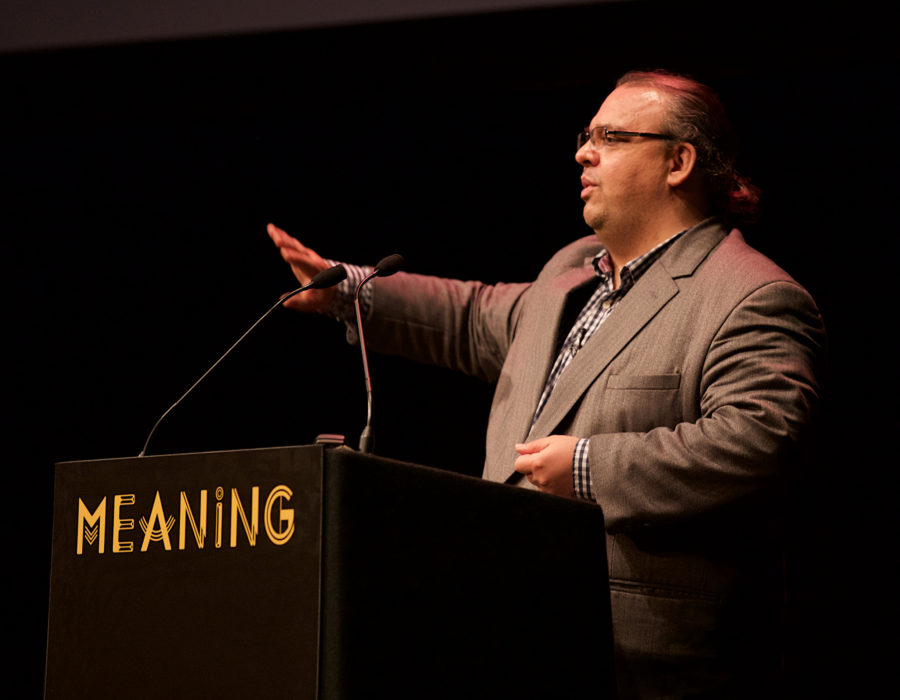Vinay Gupta: So, this is going to be a slightly harder talk than I’d imagined, for reasons that should be obvious. I’ve spent a good chunk of my life working specifically on how we were going handle climate refugees. I was expecting you know, on the order of 150 million, 250 million people. And I was trying to figure out how we could use the existing set of technologies that we have, the social organizations that we’ve got access to, to manage humanitarian need on that scale.
And after a long time working on that, what I decided was the global machinery was simply unable to conceive of taking action on that kind of issue. And I looked around for a new model of change. And the only effective actor that I could see in the world that was working with issues of at that size successfully was Elon Musk. So Musk was doing work that basically should have been the job of some kind of world government, or the United Nations or you know, the great vision for the whole of humanity. But he was working on that as an individual. He just decided that the machinery was not there at the state level, it wasn’t there at the global level, and so he just started building it himself and implementing it.
And I looked at that and said, well you know, if it can work for space maybe it can work for the humanitarian world as well. So I basically mothballed twelve years of work on emergency shelter, infrastructure management, passporting for migrants, refugees, all this kind of stuff. I basically put all of that stuff in cold storage and started working out how I could build a business that would generate the kind of reach that I needed for the kind of change I wanted to see in the world.
And that was what took me into this blockchain space. I was looking for the tools that you could use to solve global problems in an environment when the nation-state has turned out to be a very very ineffective set of machinery at all.
So I’m going to talk a little bit about the technology. I’m going to talk a little bit about what it does and where it’s going. And then I’m going to try and tell a story about the kind of global long-term picture that we could get if this stuff actually works.
So. Could I have a quick show of hands, how many people own any cryptocurrency at all. Bitcoin, ether, anything like that. It’s probably…maybe one in…five? One in ten? How many people have heard of blockchain and Bitcoin and all the rest of that stuff. Damn near everybody, okay. So that’s the gap that we’re going to try and close today.
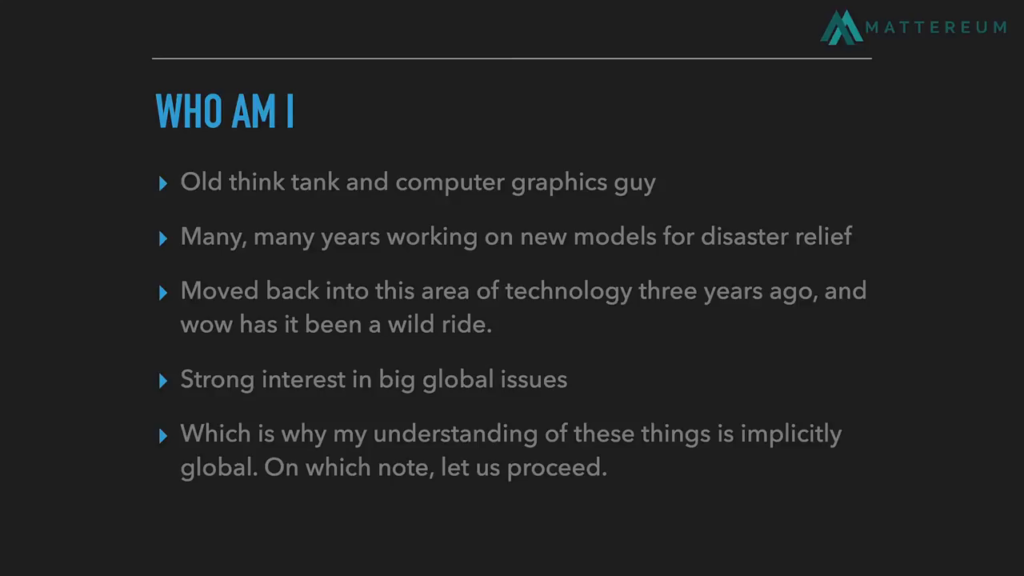
So, where’d I come from? You know all this kind of stuff, right. Started out as a technologist then went into defense, security, and resilience. Tried to figure out how to do this kind of large-scale systems protection work. Couldn’t find the platform do it, moved into tech. We’ve already covered that. Was one of the team the launched Ethereum, which is also a useful detail.
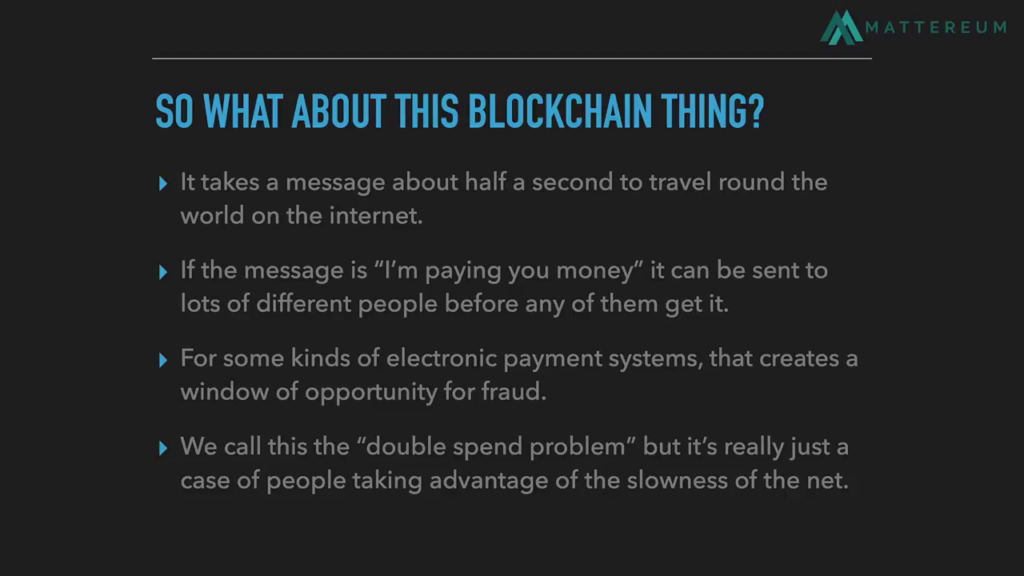
So, the blockchain. The real reason that this stuff exists is the Internet is very slow. It takes roughly half a second for a message to get all the way around the world. And in computer terms, half a second might as well be a week and a half. You can do payments at the rate of something like 25,000 payments a second if you’re a company like Visa. So the half a second delay in a message going around the world is basically 10,000 payments made. And if you’re working with some kind of technology which allows a payment to be made instantaneously— So I send you a message and the message is immediate payment, the risk is that I send a payment to Australia and while the payment is on the wire and it takes a quarter second to get there and another quarter second to get back, I then pay the same money to a bunch of other people.
And this is known as the double spending problem. I take my money, I throw it to Australia. While it’s in flight I give it to a bunch of other people. Then it lands in Australia and now we’ve got to decide who it is that actually got paid. And that problem plagued electronic payments for years, which is why the way that we handle electronic payments is credit cards. The credit card solution that we’re using is there because this kind of more advanced system always had this bug that the slowness of the Internet allowed for this kind of fraud. And it was a real problem.
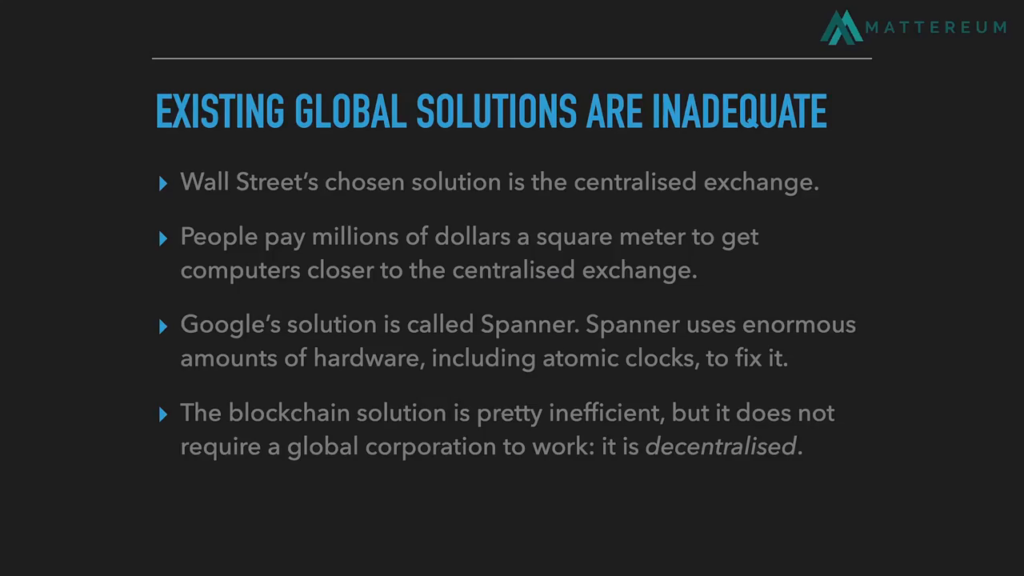
So there are a set of ways of looking at that that we’ve used as approximations to solve that problem. The first one of those, the one that’s the most common, is called HFT, high-frequency trading. You put an enormous machine, a supercomputer, and you send the transactions over to the supercomputer. We clear the transactions in the supercomputer, and the payments are made there.
But then you say well, where do we put all the machines which are instructing the trades? Where are your machines or my machines in that story? Because the closer they are to the exchange, the further forward they are in the queue of transactions. So what this results in is the situation in New York where you have the New York Stock Exchange (and the commodities exchanges work similarly), and they’re surrounded by rings of computers and supercomputers that are packed physically as close to the exchanges as possible to get the earliest response to news and to be able to trade immediately. You know, you get some kind of fluctuation in price, all of this stuff is automatically triggered, and the trading happens essentially immediately. And those kind of systems are…that’s running the global stock market, right. That’s how everything is actually held together. Very very very odd.
The other approach to this is Google’s Spanner. And Spanner looks at the same kind of problem, how do we synchronize all this trade. And it does it with atomic clocks in every data center that Google operates, pretty much. And they very carefully measure the amount of time it takes for information travel between the centers, and they’ve got a bunch of software that does very advanced physical modeling. And at the end of that, they get the ability to keep all the machines that Google operates synchronized in a way that provides services like Google Docs. The ability to get collaboration where you’re editing a document at the same time as somebody in Australia, or somebody in America. Or you’ve got an international team all working on the same document. What’s keeping all of that stuff straightened out is a network of atomic clocks in data centers called Google Spanner.
So, these solutions are widely used. A lot of work in the world is being done using those kind of tools. But it’s not the only approach that you can take. The blockchain approach is not efficient. Has everybody heard these people talking about bitcoin mining. Quick show of hands? Yes, everybody’s heard the term. So Bitcoin mining is basically how we solve this problem about synchronization in a way that doesn’t require a single corporation to be running the entire system.
So the problem with the Google Spanner approach is Google Spanner is physically decentralized—the data centers are all over the world—but it’s not decentralized in terms of ownership and control because it’s all owned by Google. So the New York Stock Exchange example, it’s neither physically decentralized nor political decentralized. All the power and all of the hardware are in the same place. So the blockchain is attempting to get both physical decentralization—so the whole thing is operating globally without a fixed center like Spanner—but it also wants political decentralization.
So instead of having “Bitcoin Inc.” as a company that owns all of the bitcoin systems in the world, the thing is basically an anonymous decentralized network. You take some computers, you put them into the Internet, they join the network by communicating with the other machines, and you have a kind of collaborative consortium of unknown tens of thousands of people whose computers together form what you think as Bitcoin. And that is called decentralization.
It’s very unusual. It’s a kind of new human organizational structure. We haven’t seen anything that really works that way before except possibly markets. And it has a very broad possibility for future transformation. Whether it will be as revolutionary as people hope or not is an open question. But you know, when you see something which is new at that fundamental a level of human society and human culture and human technology, at least the possibility that something genuinely transformative will happen is realistic. There is a very real chance that this stuff will be epochal in its impact. But you know, it’s still in the wait and see phase. Just because it’s possible doesn’t mean it will happen.
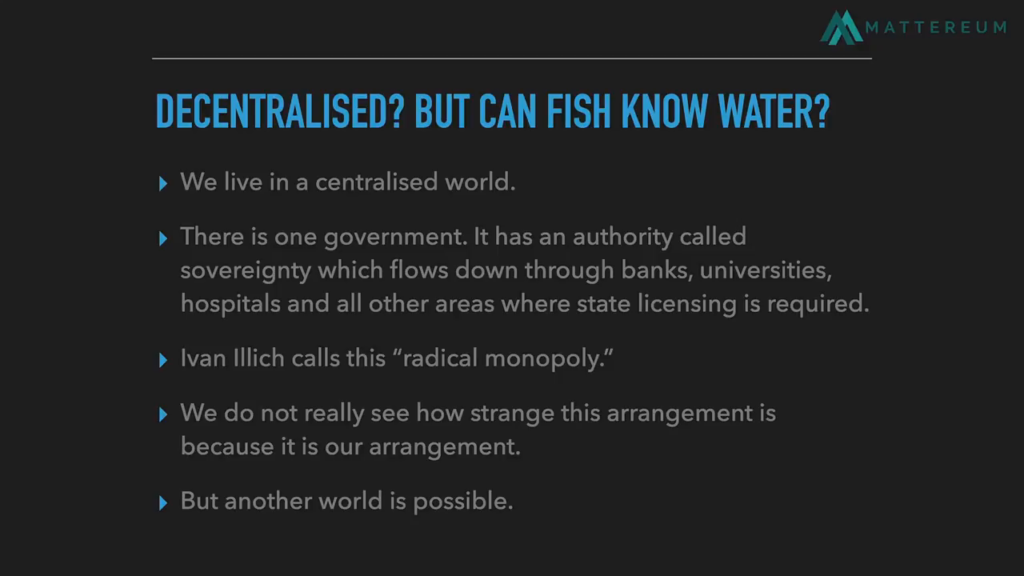
So this decentralization thing is hard to describe because the world that we’re in is extremely centralized. Almost everything that you touch has an owner, and you either are the owner or you’re renting it or you’re borrowing it. But for the most part, things have these kind of chains of custody that go from us to somebody else. Even things like your house. Your house sits on a piece of land. If you’re lucky enough to own your house, you may or may not own the land under your house. Even if you own the land under your house, it’s still embedded within the framework we call the UK. And the UK has a single point of control which is called the Crown. Or the state. Sovereignty.
And this sovereignty thing was more or less invented. And whether you think of it as something that comes with the first human cities, or whether you think of it as something that was ratified in the Middle Ages with the Treaty of Westphalia, however you think about it the assumption that for any given patch of land there must be an authority that governs what happens there, and if there isn’t something is fundamentally broken, is an underpinning assumption that has gone from land, where it might make some sense (or might not) into every other aspect of life. We expect systems to have owners or operators, and when we come across a system that just works without an owner or an operator, we don’t often perceive how strange and how radical that is.
So, all the way through the 80s and 90s, there was a near-messianic faith in this thing that people called the free market. That there was going to be some kind of instinctive mass collaboration that would be facilitated by price signaling, and you could take a lot of the key functions of the state, you could hand them to the free market and everything would mysteriously just work.
No, I think we can all agree that has been a project with at best mixed success. But it gives you a sense of why people are excited about this whole decentralization thing. The prospect that you could take the problems that the free market has been unable or unwilling to solve and you could deploy another thing which is not a centralized control structure but has the ability to do problem-solving at scale, and you could kinda push it into the gaps is very exciting. And there are some really big gaps that that might provide us a little bit of leverage on, and I’ll talk about those a little later.
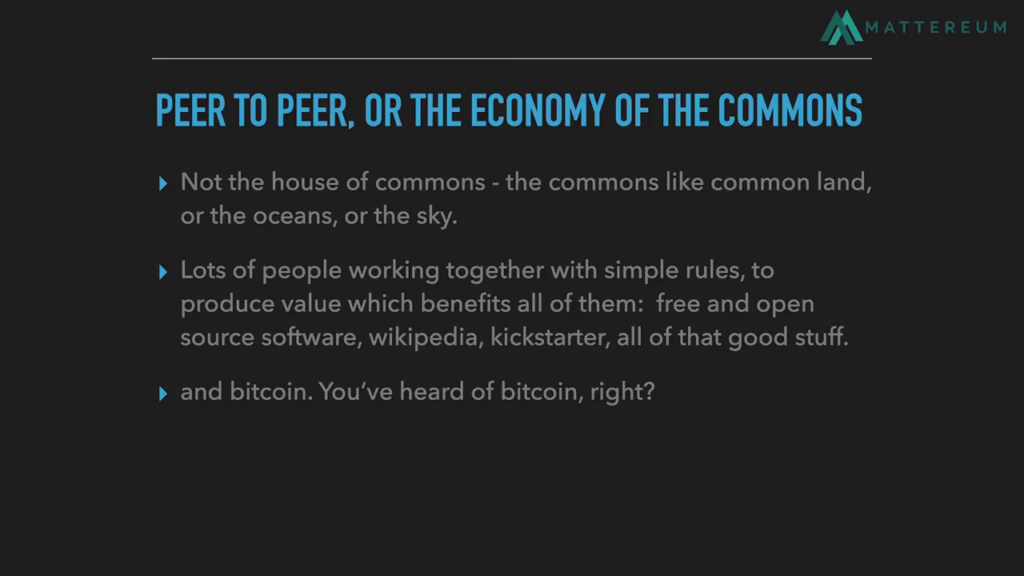
Now, the peer to peer economy, right. This is a newish thing. It’s always been there in a kind of informal sense in things like agricultural markets, people swapping goods and services with each other. There’s always been an ability for us to seek solutions collectively without having to channelize ourselves down a specific track. There’s always been that implicit thing. And commons that you might find access to. Things like academic libraries or academic knowledge. There’s a kind of global collaborative structure where we search for truth together through repeatable experiment, the scientific method, or historical investigation.
And that commons…you know, scientific knowledge doesn’t have a central owner. There is no Ministry of Science which owns the entire world’s scientific knowledge. It’s kind of a collaborative endeavor and it is in some ways another thing a bit like the market. It’s this process that the whole of humanity is involved in, and when it works well you get you know, partial cures for cancer. And when it goes badly you get scientific fraud. It’s a thing that performs in some situations and not in others, but we still have a certain amount of faith in science as a process.
So, in the last twenty years, really starting with Richard Stallman of the free software movement, there’s been a movement towards a new way of producing knowledge. Or at least the artifacts of knowledge. And they call this commons-based peer production—that’s Yochai Benkler’s term. Stallman calls it the free software movement. Open source tried to depoliticize this free software movement and make it more acceptable to companies. And one of the fruits of the open source movement is the Android phone operating system which runs something like 70% of the world’s telephones. That’s free—open source software. I’m not even sure if it’s technically free software. It might be.
So that project has been very successful. You’re all using open source software every time you use the Internet, for example. Because most of the backbone machines that run the fiber optic cables and so on are open source. And the idea that this kind of peer production approach is capable of doing large-scale problem-solving has been pretty well proven by Android and before that with the success of the Internet as a medium. We know that together we can do this kind of work and it can succeed and it can change the world. Albeit in small, incremental ways.
So we have the market, we have science, we have open source software. And then along comes this thing that everybody calls Bitcoin. And Bitcoin is where we begin to see the real direct incursion of this commons-based peer production directly into the machinery of market capitalism.
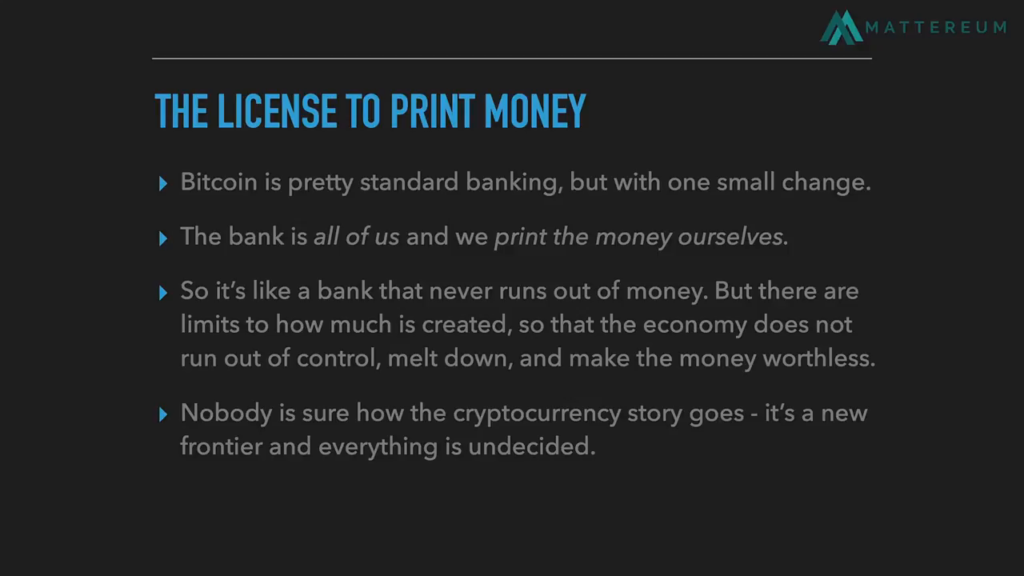
Somebody figures out how to use peer production to produce money. And not to earn money. You know, where the money is produced by the central reserve bank or it’s produced by the Bank of England. Not to take the money that somebody else has made in some kind of mysterious legal process. But to actually just…produce money. And if you think about it that’s a remarkable thing. You know, the idea that you would just have a group of people get together and create currency…kind of a surprise. It used to be very common. That kind of stuff used to be how the world worked. There’s all kinds of histories about large stone wheels and carved shells. Cultures have always had ways of creating tokens for trade, because carrying stuff around has been too heavy.
But it’s not happened in a long time. And to have some people figure out how to do it at Internet scale was really quite revolutionary. And this is going back more than half a decade now. It’s been a while since that breakthrough was made. It’s been incrementally refined. It’s been polished. There’s been a whole bunch of work on taking that license to print money and making it more and more and more effective. And this has produced the thing called Bitcoin.
So let me explain a little bit about how the Bitcoin thing works, just to sort of give you some sense of the underlying architecture, the thing which is happening under the surface that produces this strange effect.
So, you have a global computer network which is large. It’s on the scale of the computer networks of Google or Facebook or Amazon. You know, it’s a thing that exists in the form of endless warehouses consuming enormous amounts of electricity. And what it produces is a bunch of computing. There are no direct services produced. It’s not like these computers are loading web pages. They’re engaged in an enormous collective grind to produce security for this currency. And what they basically say is unless you’ve got more computer power than all of the machines which are in the Bitcoin network, you won’t be able to fake a transaction. You can’t fraudulently spend other people’s money unless you can do more computing than the entire Bitcoin network.
And the expenses of the people running those machines are paid for using Bitcoin. So when the Bitcoin network was small and the money wasn’t worth very much, when Bitcoin was trading for two or three cents rather than $7,000, the machines that were securing the Bitcoin network were not very numerous. And they weren’t very specialized. It was you know, hobbyists with a couple of decent machines sitting in a hall closet. And those machines would produce five or ten dollars a day. And that was enough to pay the bills for the electricity and it was enough to pay for the hardware—it was a couple of thousand dollars-worth of graphics cards.
And Bitcoin rapidly moved from that phase to having custom silicon chips made. And then the custom silicon chips wound up in very large warehouses with heavy engineered cooling. And every time more people wanted to buy Bitcoin or Bitcoin became more expensive, securing Bitcoin became worth more money. So people spent more money to secure it. And so there was a kind of incremental stepping ratchet where when Bitcoin was worth more money people would spend more money on computers to secure it. And then once people were sure that that new level of security was in place, the currency would rise again.
So this is a very very capitalist system. It’s very very very market-based. And as a result it’s been able to compete very effectively in a market-based world. It’s not really a utopian project in the direct sense. It was a machine that was made to survive capitalism and it’s done very well. But it’s survived capitalism largely by being capitalism. And that’s a really important thing to understand. A lot of people come to Bitcoin with a very utopian vision of how this is going to transform humanity. But it is unlikely that the cure for capitalism is more capitalism.
You could suggest that there are certain misfeatures of capitalism that a better capitalism would cure. But I think it’s reasonable to talk about Bitcoin as being a potential approach to taking some of the problems in capitalism and getting rid of them. But the problems which are inherent to capitalism are unlikely to be solved by Bitcoin or things which are too closely related to it, right. It’s a market system.
However, what it has done is the entire kind of Bitcoin and associated world is currently worth about $200 billion. So, in the past less than ten years, $200 billion has been printed by a collective of nerds. And it wasn’t that they made companies and then sold the companies for dollars. They skipped that intermediate stage where you make companies, and they just sold the dollars. They just sold the bitcoin.
It’s remarkable when you think about it. I mean it does sound a little perpetual motion machine. And you sort of think well, but…can that possibly be right? And the answer is nobody’s quite sure. It works, it’s here, it’s demonstrably successful by all the metrics that we measure these kind of projects by. But there is still this thing where you kind of stare at it and you’re like, “That can’t actually be what it looks like.” It’s exactly what it looks like.
And in the long run, we look back at moments like that and we call them revolutions. Heavier-than-air flight was impossible. It was impossible. Only birds and insects could have heavier-than-air flight. It was thought to be something that was forever outside of the reach of human beings. And you know, I can’t remember the exact quote but the feeling that heavier-than-air flight would never happen was the common scientific opinion of the day. And then the Wright brothers, who haven’t really been told it’s impossible, go out there and they do it.
And at the point everybody’s kind of looking around like, “What do you mean it flies?”
“No, it totally flies.”
“You’re kidding.”
“No no, they’re really doing it.”
“How does it work?”
“It’s basically like a motorcycle with wings.”
“That can’t possibly work.”
“No no, but it really does.”
And then you come back you know, fifty years later, and the entire world is dominated by flight.
So that’s sort of what’s happening with Bitcoin. It’s a revolution in that you stare at it, and you keep staring at it, and it doesn’t get any more sensible and it doesn’t go away. And once you’ve got a couple of generations of kids who’ve grown up with that thing always there, they’re just going to turn around and be like, “But…what are you talking about? It’s always been this way.” Because it’s only the people that are in that bridge generation when something went from being impossible to being possible that get the experience of this revolutionary feeling of “I just don’t understand and this doesn’t make any sense.”
After that bridge generation… I know a couple of kids who are 15 or 16. And they’ve made— Maybe one’s 15, one’s 18. They’ve made more money than their parents have made in a decade, trading what started out as pocket money. And for them this is normal. “Well yeah, of course we just keep a really close eye on the markets and you know, every time we get some pocket money we buy some more coins.” And pretty soon they’re paying their way through university on the basis of trading peer-to-peer currencies.
And for them that’s totally normal. They don’t think of it as being strange at all. It’s always been there for them. They hit adulthood at the same time as these technologies went mainstream, so for them these technologies are mainstream.
So as we move forward, what you’re going to see is a generational divide where there are people that just looked at it and didn’t understand it and weren’t curious. There are people that saw it come over the horizon and get very engaged in trying to figure out what it is and how to use it and how it will all work. And then there’ll be people for whom it’s always been there.
Now, we used to talk about digital natives. Now what you’re going to see are Bitcoin natives or crypto natives. And you know, it’s important to understand when you start meeting these people that they’re not mad. They’re just young. And we have to sort of make allowances for the fact that for them this is totally normal; the world has always been this way.
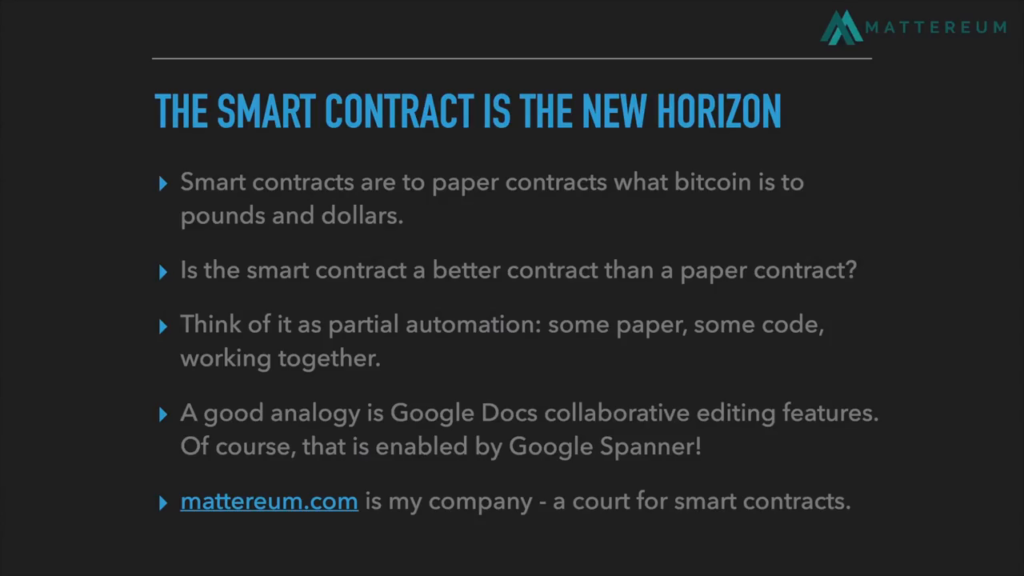
Now. It gets worse. So, now we have this system where we have a kind of global transactional logging thing, right. Everything is in this big computer network and everything’s linked to everything else. And the project I was part of it is called Ethereum. And Ethereum came along a few years after Bitcoin and said, “Well that’s really fun, but what if it was programmable?” Bitcoin was like a bank account. You had coins. You could receive payments, you could send payments. Well, that’s okay but why can’t I write a little computer program that figures out when something should be paid? Suppose I want a direct debit and I want to make a payment once a month. Well, why can’t I have a program that does that?
“Well, why don’t you just run it on your laptop?”
Well, what if my laptop is closed? What I want to do is I want to take the logic for that repeated payment and I want to put it in my bank account. Kind of like you do with a standing order.
So the idea of writing little computer programs that do things like standing orders and putting them in the bank account, kind of lodged with the “bank” (only there’s no bank, but kind of lodged with the bank), gave rise to this idea of Ethereum. We’re going to make a programmable blockchain. So, you have this network—the big computer network is called a blockchain. You have the big computer network but now you can write little programs that run it.
And for historical reasons these little programs are called “smart contracts.” And smart contracts are not particularly sophisticated yet. They’re nothing like legal contracts. They’re really much more like standing orders. Programmable payments or programmable money are good ways of talking about them.
So, the kinds of things that you can do with smart contracts that you can’t normally do are relatively simple things. So, for people who are buying and selling across currencies you can do things like have an order that when a particular currency becomes cheap you’ll automatically buy some of it. But that system isn’t run by a broker or a dealer, it’s kind of inherent to the fabric of just carrying the payments. Rude programmable money.
You could take an example for something like a gambling game. If two people want to play poker on the Internet, they’re either trusting somebody to sit in the middle of their poker game and take the payments from both sides and deal the cards, but if you’re very very very clever, you can write a smart contract that basically generates the cards, and takes the payments, and transfers the money to the winner when the game is over.
And that sort of stuff sort of has limited utility. There aren’t that many people that enjoy poker. But you know, the sort of seed of the idea is there that if you could do it for poker maybe you could do it for auctions. And if you do auctions that have this kind of automated logic and instant payment and all the rest of the attributes you get from these things, you begin to think like maybe that’s a part of the real world.
And if you had a system where you had the ability to do an auction but it didn’t go through something like eBay… You know, eBay charges quite a lot money for hosting auctions. Something like 10% of all the money that goes through eBay stays with eBay. And that’s why eBay is an enormous company. Well, the buyers and the sellers are paying for eBay to exist, in the same way that the buyers and the sellers are paying for Uber to exist. In the same ways that the buyers and the sellers are paying for Airbnb to exist.
So quite a lot of people who are involved in this whole space—blockchains and cryptocurrencies and all of these things—are looking at those enormous companies as potential inefficiencies in capitalism that could be pulled out and replaced. If you have something that works like eBay but it’s 10% cheaper you will tend to shop there. If you have something looks like Airbnb and it’s 10% cheaper you’ll tend to shop there. And these things, because they’re living in this global computer network rather than inside a specific cluster of servers somewhere, these things have a certain magical property, which is that they’re global by default. They’re everywhere from the day that you launch them, and the service is universally available.
And this is quite interesting, because you think about the edge of the network. You know, we’re not really very good at going beyond say the two billion richest people on earth when we begin to talk about the Internet and the services that it provides. But if you’re in a position where some bunch of kids build a hotel rental web site for California, but it’s actually on the blockchain and it’s global by default—it’s just born global. And then you discover that folks in South Africa are using it to rent housing to each other. And then the next thing you know it’s Mali. And then you realize that it’s being used in villages all over the world for some completely unintended purpose. That kind of output and outcome is much more likely with blockchain than it is with the conventional sort of web site model.
The fact that these networks are inherently global; the fact that all the logic is kind of buried in the payments architecture; the fact that there’s no real recognition of international borders in these systems because they all operate embedded in the Internet; they don’t see the world as a set countries, they just see it as an enormous global network. All of those things point to the possibility, currently very far off, but they point to the possibility that you’ll begin to see global service architectures that run on these systems. Not just the payments, which we already have and they’re being used very successfully in a lot of poor countries. But also the possibility that the services which are built on top of those payments will turn out also to be global by default and that that will turn into a very substantial development bonus.
Very early days, right. We’re at the point where we’ve just about got the thing off the runway. We’ve given it a few kinda scoots around. But in terms of the size of these systems you know, 200 billion sounds like a lot of money. But the total value of all the things in the world that have prices is said to be $700 trillion. So we’re in a position where we’re only at the very very very beginning of this kind of digitization of money. This is only the start.

Now. The last thing I want to talk about is the really ambitious global megaproject. So, we would quite like, as a species, to send some of our monkeys to Mars. Maybe we just want a look around. Maybe we just want to say that we did it. Maybe it turns out to be possible to live up there and make a living up there, and we could go out there and we could do a whole bunch of the nasty, dirty, planet-destroying industrial engineering that we’re currently doing on Earth. And we could do it in a place which has no living things to disturb.
And you sort of think you know…actually if we had another planet that didn’t have any trees or soil and there was nothing you could poison, maybe we could take a whole bunch of these filthy industrial processes and just do them there. And if we’re going to be able to do that in fifty years, you sort of have to start thinking about it now.
And it might require technologies like space elevators but there’re lots of people working on that kind of stuff. And you know, one way or another you go from the Wright brothers with this single plane that looks like a motorbike with wings to the entire international air travel system with tens of thousands of airports and hundreds of thousands of planes and billions of passengers a year, that happens in fifty years. So, for people today to be looking at Mars and thinking you know, “what if?” I don’t think it’s going to take fifty years for Mars to get really interesting. I think it may only take twenty years. And half of the people in this room have a mortgage which lasts longer than that.
So you know, if you sort of think of this as like, could there be people living and working on Mars by the time I pay off my mortgage? Yes, there really could. So, I think that we could do this kind of global project, financing and organizations stuff using these global payment architectures like Bitcoin and Ethereum and the other things which people are building. Everybody in the world that wants to see Mars happen puts some money into a hat, and if they successfully go to Mars and it turns out to be enormously profitable for some as-yet-unspecified reason, everybody that put money into that hat gets to take more money out of the hat.
But it would have to be done in a really well-organized, global way. And so much money is required that I think you’d have to be able to fairly easily take money from anybody on Earth, for any reason, who wanted to put money into those particular hats. You know, if we’re passing the hat to build a spaceship to go to Mars it’s going to have to be a very big hat and it ought to be global. Because we’re doing it together—it’s a thing for the entire human species.
And you could say the same thing about climate change. We’re having real problems financing climate change because everybody’s pointing the finger at everybody else and saying, “Well why don’t you pay for it?” But if we had clear, global records about who is emitting the carbon, who is benefiting financially from the carbon being emitted. If we could visualize that whole carbon economy, and with computers you can do things like that if there’s the will to do it. Then we could also start talking about having large-scale global visualization of the mitigation efforts. When we’re working on trying to stop these kind of problems, we could have a global visualization of the problem and we could have a global hat into which the money is put to buy a solution. And because of the extremely secure record-keeping that these Bitcoin or blockchain systems have, that would allow us to clearly identify where the money had been spent.
Same thing applies to things like the migration problem. If you want to be able to issue passport-type identity documents to everybody on Earth, if you’ve already got a system that’s capable of storing data in this completely secure, global way, you could attach the identities to those systems. And if you’ve got the right kinds of security around that, you could have a global identity system that gave services to people that couldn’t get those services from their nation-states.
So, there are a set of very large global problems that are largely above the pay grade of the nation-state. The sovereign entity that we’re part of, the UK, really doesn’t work at the global level very much. It’s got a certain amount of outreach. I think their international aid budget’s about 2%. But more or less the UK sovereign government exists to organize affairs that are in the domestic arena. We have a shore. If it’s inside of our shore we’re kind of responsible for it. And if it’s outside of the shore, well somebody else ought to be taking care of that. But the somebody elses are not doing such a great job on a lot of this stuff.
So, the sort of notion that you could build these kind of lightweight, large global systems is not fundamentally unrealistic. You know, Wikipedia really did make a pretty good stab at organizing all of the world’s knowledge into a sort of coherent, searchable, findable thing. It’s not all of the world’s knowledge. It’s not perfectly representative. There are weird corners where it’s got endless amounts of unnecessary detail and trivial things and big holes where it hasn’t covered something important. But as a first approximation, it’s not bad, and their budget’s only about $5 million a year. It’s not a very well-funded organization and it’s doing great work.
So, the idea that the response to climate change and space colonization and global sort of identity and care for poor people could be these enormous global machines which are largely run using the global payment infrastructures, that are very lightweight and self-organizing and that are closer to Wikipedia than say, the New York Stock Exchange, this doesn’t seem unreasonable.
So whenever somebody talks about Bitcoin or the blockchain, you hear people talking about this. Remember we’re still at the sort of motorbike with wings stage of the engineering. It’s very early days. We do have prototypes—they do fly. They’re carrying a few hundred billion dollars’ worth of transactions. And that’s quite an impressive thing. But compared to what we’re going to see over the next five, ten, fifteen, twenty years, I think we’re going to see this as the Wright brothers phase of the blockchain ecosystem. This huge global computer network that we’re putting together is the next stage of the Internet. It is going to solve problems that the existing generation of the Internet can’t solve. And if we get it right, it might really help with some of the global problems that we’re currently unable to face. Thank you.
